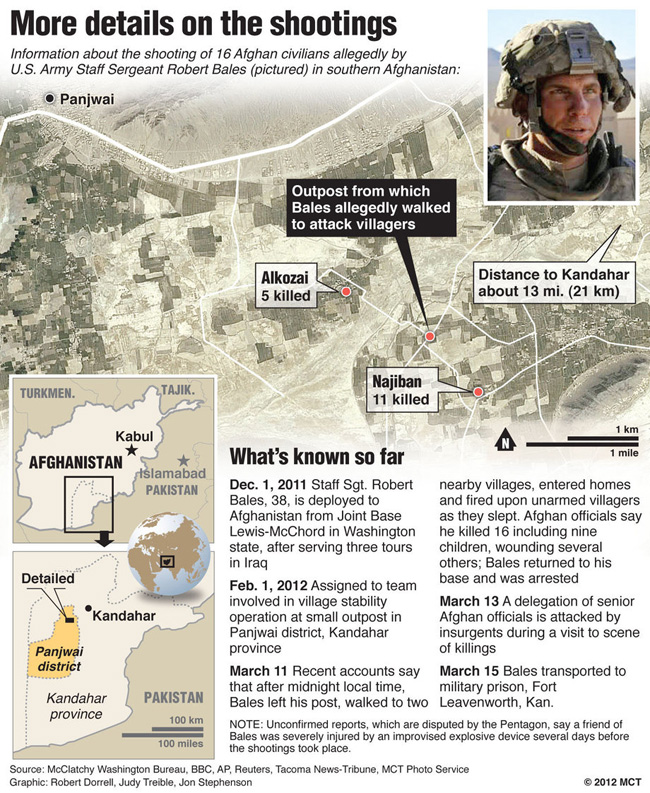Washington – The U.S. military on Friday formally charged Army Staff Sgt. Robert Bales with 17 counts of premeditated murder, meaning the 38-year-old soldier could face the death penalty if convicted of a March 11 rampage in southern Afghanistan.
The military also said for the first time that nine children were killed and four were wounded in the early morning incident in southern Kandahar province. Their ages were unspecified and the manner of their deaths wasn’t released, nor was any motive for the killings, which have shocked Americans and Afghans alike and raised new challenges for an orderly U.S. exit from the decade-long war in Afghanistan.
Bales, married and a father of two, was also charged with the premeditated murder of four women and four men, and with attempting to kill two others. The dead died of
gunshot wounds, and the charging document said that wounded were shot in the neck, chest, thigh and groin.
Bales was informed of the charges against him at the military prison at Fort Leavenworth, Kan., where he’s been held since March 16, officials said. The next phase of his case will be what is called an Article 32 hearing — the equivalent of a preliminary hearing in a civilian court — which will take place at Joint Base Lewis-McChord, south of Tacoma, Wash., where Bales has been based for the past decade.
Under military rules, that hearing, where an investigating officer will determine whether there’s sufficient evidence to bring Bales to trial, must take place within 120 days of his arrest, which was March 11. The military court can, however, add to that time based on lawyers’ requests.
It was unclear whether the trial, if it takes place, would also be held at Lewis-McChord.

Military officials said little else about the case. The official account is that Bales left his outpost in the Panjway district of Kandahar in the early hours of March 11, carrying his service weapon, and that when he returned civilians had been killed in two nearby villages.
If convicted of premeditated murder, the charging document released Friday said that Bales could face a mandatory minimum sentence of life imprisonment, with eligibility for parole.
The document noted that the veteran of three tours in Iraq before being deployed to Afghanistan in December earned $3,243.30 a month, not quite $39,000 a year.
Bales’ civilian attorney, John Henry Browne of Seattle, has said that his client remembers very little about the time during which the military has said the incident took place and that his mental state could be an issue at the trial. Browne said Friday that Bales was suffering from memory problems prior to March 11 because of a “serious” concussion that wasn’t treated, although he didn’t elaborate.
“This is going to be a very difficult case for the government to prove, in my opinion,” Browne told CBS News.
Browne also told Seattle radio station KOMO Friday that he believed the case wouldn’t go to trial for two years.
It will be nearly three years before the lone suspect in the deadly November 2009 shootings at Fort Hood, Texas, stands trial. Maj. Nidal Malik Hasan is expected to face trial starting in June.
(Adam Lynn of The News Tribune of Tacoma, Wash., contributed.)
© 2012 McClatchy-Tribune Information Services
Truthout has licensed this content. It may not be reproduced by any other source and is not covered by our Creative Commons license.
Join us in defending the truth before it’s too late
The future of independent journalism is uncertain, and the consequences of losing it are too grave to ignore. To ensure Truthout remains safe, strong, and free, we need to raise $29,000 in the next 36 hours. Every dollar raised goes directly toward the costs of producing news you can trust.
Please give what you can — because by supporting us with a tax-deductible donation, you’re not just preserving a source of news, you’re helping to safeguard what’s left of our democracy.